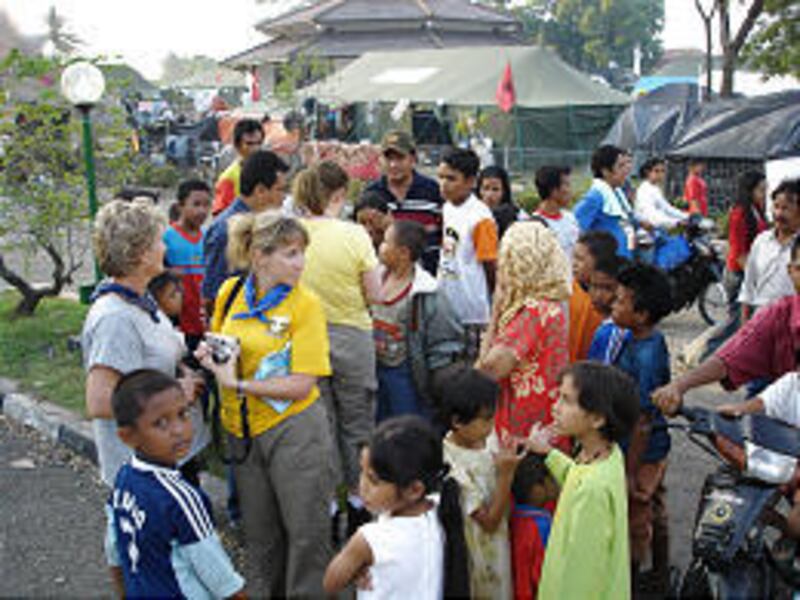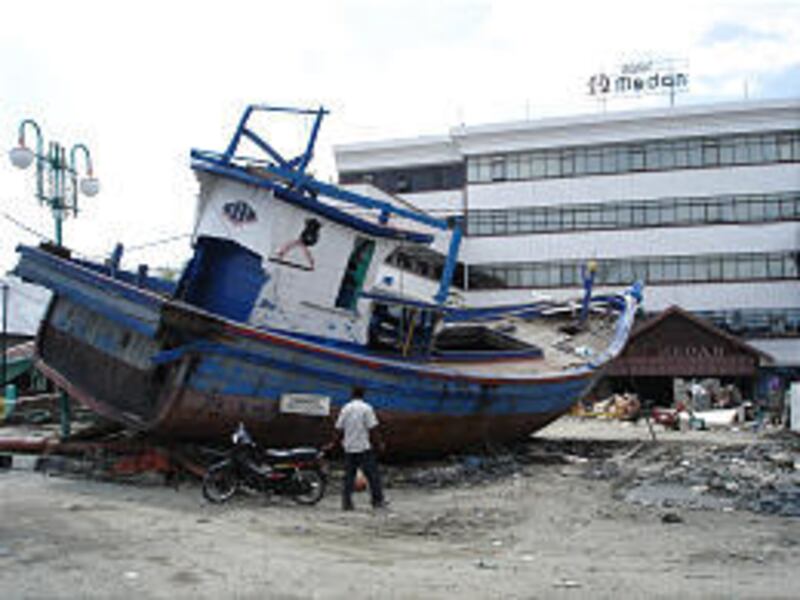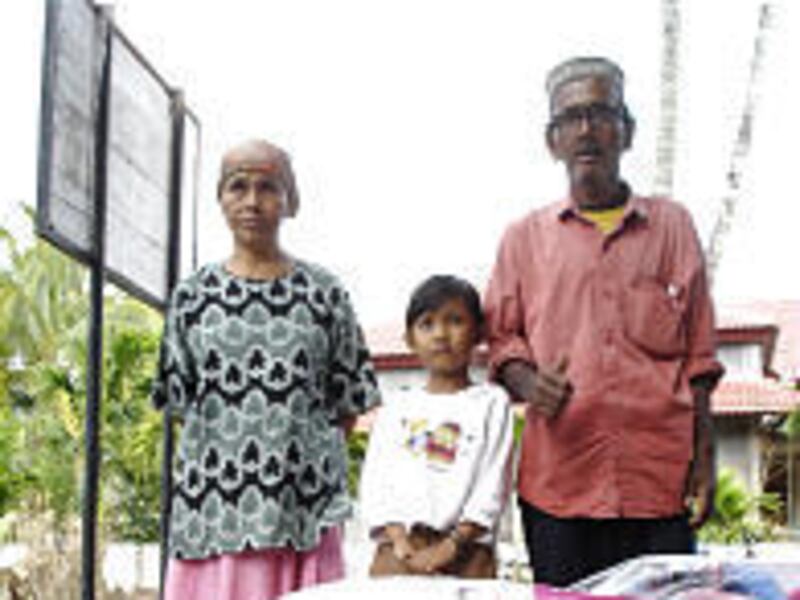Editor's note: KSL Newsradio Managing Editor Russ Hill spent 10 days in the areas hit hardest by the recent tsunamis in Southeast Asia, reporting on the relief efforts of the Utah-based group Mothers Without Borders.
BANDA ACEH, Indonesia — From a distance he looked suspicious.
A man wearing a loose buttoned-up white shirt and no pants struggled to pull himself up a steep sandy embankment. After conquering the small hill, he leaned over to pick up the pants he had apparently shed earlier before venturing out into the ocean.
Now dressed but without shoes, the man set his sights on two visitors from Utah walking toward the beach. As he quickly approached, the visitors became anxious. What did he want and what was he doing here?
"House," he said as he pointed to the broken concrete a few feet away. "Sea. Finished. Babies," he said in a mixture of broken English and some form of the local language. His words were difficult to understand as he spoke while struggling to breathe.
"Oh, no. He came back and his house was finished," said Vicki Nielsen, one of three Utah women from the Utah-based group Mothers Without Borders who had come here to help in the world's largest-ever relief effort and to learn and prepare for future disasters. Between trips to survivor camps and assembling relief kits, she decided to hike down to the sandy beach where a few weeks before a deadly tsunami roared ashore, wiping out half of this city.
"Those are baby clothes," she said to the dark haired man, who was drenched and exhausted. After looking down at his hands and seeing one of them was clutching a dirty, yellow baby onesy, the man's situation became clearer.
"You were out at the sea when the tsunami came, and you came back and there was nothing?" Nielsen asked while struggling to interpret his words. "Yes, yes," he repeated over and over.
This man, who appeared to be in his 30s, held out his hand and pointed one by one at four of his fingers. "My babies," he said. Then he extended his thumb and using his other hand pointed at his thumb and then at his heart. "Your wife?" Nielsen asked. "Yes," the man replied. He had lost them all.
Nielsen put her arms around the man, hugging him, and softly told him, "I'm sorry. So sorry." As the two strangers wept, memories of the three days of uncomfortable travel and seemingly endless delays in reaching this remote area of the world vanished for Nielsen. Thoughts of her discomfort and fatigue were replaced by an insatiable desire to somehow comfort a victim of one of the worst international disasters in modern times.
Kathy Headlee, the founder of Mothers Without Borders, had organized the trip and recruited her sister Carolyn Sharette, a registered nurse, and Nielsen to accompany her. The three have experience helping orphaned and disadvantaged children. Each year they lead dozens of volunteers who pay thousands of dollars to travel to Africa, where they spend their vacation time building schools or teaching mothers to crochet. They're used to traveling to remote areas but not disaster zones.
Now, they were at ground zero of the Southeast Asian tsunamis, witnessing first-hand devastation not seen in generations. The city they had traveled to sits on the northern end of the Sumatra Island. The provincial capital of Aceh was one of the first places hit by the tsunami, which was triggered by a 9.0 earthquake on Dec. 26 in the Indian Ocean.
Besides killing tens of thousands and leaving many thousands more homeless, the monstrous waves washed away almost the entire downtown and commercial district of this city, as well as more than three miles of dense residential housing. This city that had been off limits to foreigners for three years because of an intense separatist movement was now temporarily open to international relief efforts. Most who had come to dig through the rubble, clean up the bodies, and assist the tens of thousands of homeless were military, U.S. military.
"How many children are here?" Headlee asked the tired women who greeted the small Utah group as they walked toward a set of buildings.
"One hundred sixty," replied a young local doctor who accompanied the relief workers. Headlee, Nielsen and Sharette had met up with a team from Project Concern, International as soon as they arrived in Banda Aceh. Part of the PCI group were two local doctors and a nurse whose hospital was destroyed by the tsunami. The medical team accompanied the Utah women as they traveled to camps of displaced Indonesians.
"Of the 160, how many lost parents?" Headlee asked. The male doctor asked the so-called camp chief to look through his notebook of the people registered to live here. One page listed the newborns, the next page was for 1-year-olds, and so on. "Fifteen," replied the doctor, for this camp.
Immediately outside the room where the camp chief sat, were women looking after a crowd of children. Nielsen walked into the camp first, carrying Ziplock bags full of plastic beaded bracelets and necklaces made by a group of Salem, Utah, women. As soon as the young girls in this trash-littered camp spotted the goods they quickly approached Nielsen.
"Would you like a bracelet?" Nielsen asked as she nestled into the crowd. Dozens of arms were outstretched. Smiles suddenly appeared. "Where are you from?" a few of the girls who knew some English asked. "America," Nielsen replied. "America?" several voices responded. Most residents of this battle-torn province had never seen an American in person.
While Nielsen handed out the bracelets and necklaces, Sharette and Headlee had wandered a little bit deeper into the camp.
"What's your name?" Sharette, the principal of a charter school in Draper, asked the boys hanging on the gates of the makeshift school. Each of the boys lifted his head and proudly declared his name. The quick visit by foreigners energized the elementary school-aged kids. One of the adults who lived in the camp said 17 of the schoolkids are missing. Some of the teachers have not returned to class, either.
"Most of the teachers are lost," one of the doctors said.
"Where are the orphans?" Headlee asked. The local physician turned to some of the adults standing nearby and in another language sought the answer. "They are back in those trees," she said.
The Utah women and their local medical colleagues decided to hike through the thick, soft, fresh mud to a distant part of the camp.
After a walk up a small wooded hill in the humid heat, the group found the building that used to serve as this village's school. The homeless who had found shelter here emerged from the building to see who the strangers were and why they had come.
After pleasantries were exchanged, the questions and the heart-breaking responses began.
Child after child had lost parents who were at work or at the wrong place at the wrong time when the wave hit. The accounts were shared in seemingly emotionless, stoic, business-like tones. To the Banda Aceh residents the stories appeared so common. In the Utah women, they evoked emotion.
"We are so sorry," Nielsen said through watery eyes and a broken voice, hoping her concern would be evident even though her words were likely not understood.
From behind Nielsen, a voice came unexpectedly.
"We did not have time," one of the female doctors offered up softly but somewhat defensively.
"We only had time to get ourselves. We could not save all the children. We could only get ourselves," she said through tears before turning and walking away, apparently hoping the overseas visitors would understand how hard the adults here had tried to save the little ones.
"I feel so sad," said Nielsen as the group began to leave the camp and returned to their SUV. They had distributed some clothing and other supplies while there. "I think the hardest thing is you can't communicate to them the heart-felt hope there is because they have their God and only he can bring peace that the world can't."
The women from Utah were silent, wiping tears from their eyes, as they walked down the hill in the hot tropical sun. The faces of the camp now branded deep into each person's memory.
The emotional weight of the trip was not the only pressure this group was feeling. The physical toll of getting to this faraway place was compounded by the back-breaking effort of assembling 200 family survival kits.
The PCI team leader had come up with the idea of assembling survival supplies inside a huge tarp that would be wrapped up, tied, and then left on the beaches of remote areas west of Banda Aceh, where in some cases only 10 percent of the population survived. Relief groups were having difficulty getting to those areas, and the kits could give some of the tsunami survivors enough supplies to live for one month.
Headlee, Sharette and Nielsen took on the task of overseeing and assembling these kits made up of dried fish, a kettle, pots and pans, underclothing, children's clothes, noodles, rice and personal hygiene kits. Among the supplies were boxes and boxes of hygiene kits coincidentally assembled by members of The Church of Jesus Christ of Latter-day Saints. But for these LDS women who had played no role in getting the crates of supplies here, it was no coincidence to them that the kits donated by their church ended up at the same remote location they did.
"It is clear the Lord is at work," Nielsen said before pulling on gloves and getting to work.
The women hired several local Banda Aceh teenagers to help them assemble the kits. "OK, you, put the tarp here," Sharette ordered one of the skinny boys. "Let's get moving."
For hours, under the relentless sun and operating on only a few hours of sleep in several days, Sharette, Nielsen, and Headlee worked.
As the sun began to lower behind the palm trees to the west, the women decided the
group of a dozen paid workers and tired volunteers deserved a break. The rest of the work could wait until later. This evening, they wanted to visit with children before darkness made venturing out in the camps too dangerous.
They went inside the home to wash up as the driver who had spent several days with them prepared the car for departure. "They work so hard," he said with a look of amazement. "Does everyone in America work hard? I've never had day like that," he said as he wiped the sweat off his face.
The women loaded into the blue SUV and headed to the largest camp located in the part of the city that remains standing. On the bumpy roads, soldiers stood armed with machine guns and wearing medical masks. Almost as numerous as the soldiers were the orange or yellow bags stacked on the side of the roads. On one road, the bags of bodies were loaded onto a large truck that would dump its load in the mass grave near the airport.
"Before we get out, let's figure out how we're going to do this," Headlee told the group as they arrived at the endless sea of tents where the homeless tsunami survivors now live. "I don't want to be mobbed," Headlee explained as Nielsen stacked the Ziplock bags full of the yarn necklaces and bracelets on the car seat.
"We won't give them out in the big groups, but instead when we see that it's right," Nielsen said while stuffing the bags in her pockets. "Let's make sure we don't make a scene," Headlee replied.
The group opened the doors of the vehicle and before each person set both feet on the ground they were surrounded by children. The young crowd had no idea what the women had brought with them but wanted to get as close as possible. Sharette pulled out her camera but struggled to free her arms to take any pictures.
"Picture, picture," several young voices yelled while bodies jumped in the air trying to get in any potential shot. "Hello, hello," Sharette responded back.
The group walked through the camp giving out bracelets and necklaces to the swelling crowd, which included adults seeking anything from the foreigners.
The residents of the camp seemed energized by the interaction and attention. Nielsen, Headlee and Sharette were clearly overwhelmed.
"Look at the smiles," Nielsen said to the others. "They are smiling, everyone is smiling," she said in amazement while shaking hands and hugging dozens of children who lost everything from homes to siblings to parents. "Their resiliency is unbelievable," she said.
When asked on the car ride back to the group's temporary home, what kind of difference the group felt they were making, Nielsen replied, "We may have only necklaces and beads for these people, but we also are offering an embrace. I cannot communicate in their language the hope I want them to have for the future, but I am confident they can feel through me why I am here and the hope I bring."
"Did you see them?" Sharette asked. "We could learn a lot from them. These people have lost everything. They are living in tents with no water, no sanitation, no electricity. They are surrounded by mud. They no longer have husbands or wives. Children have lost all their family and they can manage to smile. Did you see them smiling?" she asked.
After the group returned to their house, they collected their possessions and packed for the flight home. They hadn't showered, mosquitoes had covered everything, the heat had been unrelenting, and the smell of bodies and burning debris omnipresent, but the group felt reluctant to leave. "A piece of me will always be here," Nielsen said.
After the women retired late in the night, a man who walked up earlier in the day and volunteered to help assemble the family survival kits was still sitting under a porch light outside in the wet heat. He too was reluctant to go home, if he had a home.
"Tired," he managed to communicate in English. A translator asked him a question about the Americans asleep inside. His response was put into English. "We lost everything. Our city is ruined. Why did these women come? Why come to Banda Aceh?" he asks.
For the women, the answer was clear.








